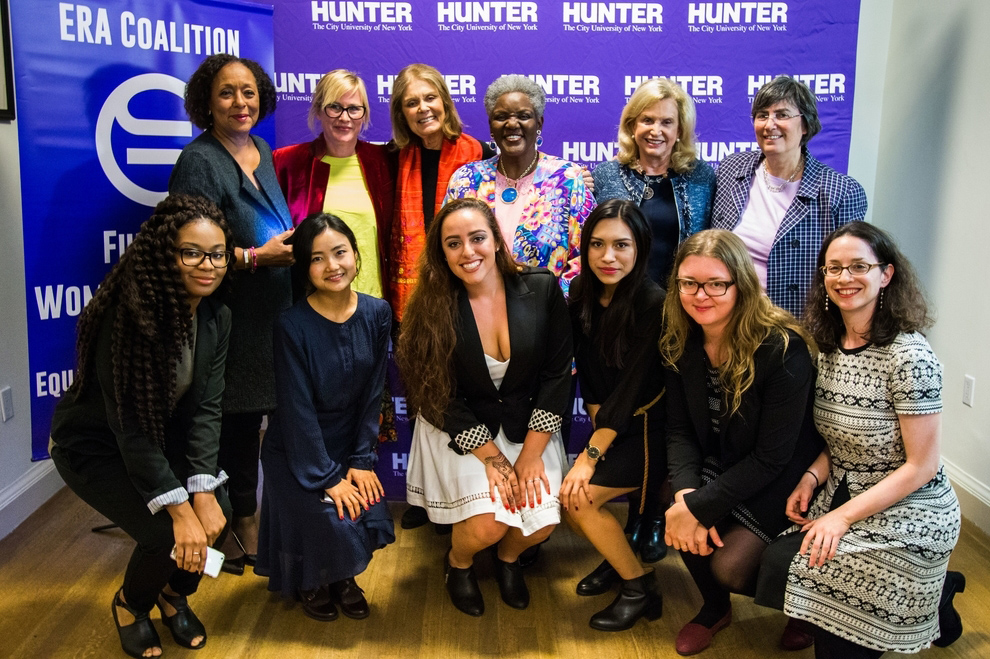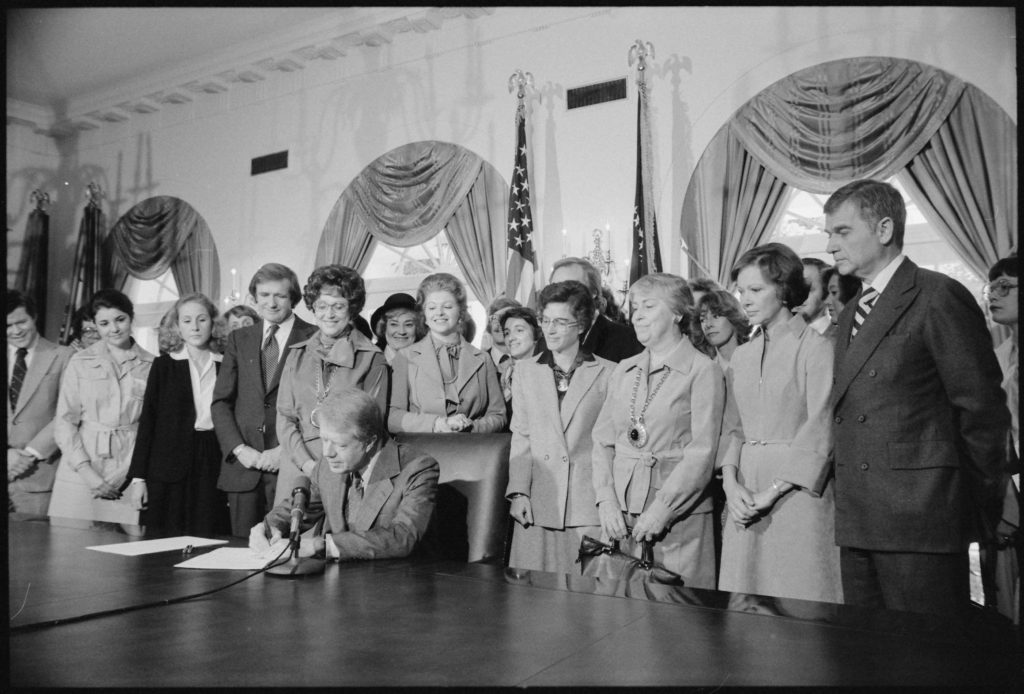
Since high school, Jessica Neuwirth has been passionate about human rights. She’s led a legal team convicting a Liberian president of war crimes. She helped hold the media accountable for its actions during the Rwandan genocide. She was also a consultant for a landmark judgment ruling that rape is a form of genocide. But it wasn’t until five years ago that she discovered one of the most important callings in her human rights career—ratifying the Equal Rights Amendment.
As the new director of the Human Rights Program at the Roosevelt House, Neuwirth comes to Hunter with years of firsthand experience in the movement to guarantee women equality under the law.
“What motivates me is a sense of outrage over the fact that we don’t have constitutional equality for women in 2018,” said Neuwirth. “It just seems to me that we’re so far behind the rest of the world.”
The ERA, which fell short of ratification in 1982, has seen new momentum in the age of #MeToo and the recent upsurge in women’s activism. It is now just one state away from having the required number needed to be adopted to the Constitution if it is passed in Congress.
Central to this success is the ERA Coalition, an organization co-founded by Neuwirth that uses education and outreach to push for ratification of the ERA. Neuwirth, who continues to serve as its president, started the organization to “really help build a national coalition to say, ‘listen, we don’t have this, we need it, we want it, and we want it now.’”
A woman for women’s rights
Neuwirth’s path to the ERA began with a visit to Congresswoman Carolyn Maloney, who represents the Upper East Side and had worked with Neuwirth in the past. She pushed Neuwirth to help build a public movement for the ERA.
“It’s been harder than I ever thought possible to get momentum for something that, to me, should be non-controversial,” said Maloney in an email interview. “So I urged Jessica to lead a coalition – which became the ERA Coalition – that could help educate, raise awareness and advocate for the Equal Rights Amendment.”
At Neuwirth’s suggestion, the two women made a crucial phone call to get the ball rolling.
“We called Gloria Steinem right from Carolyn’s office,” recalled Neuwirth.
But as she continued to make more calls, she noticed a problem: most people mistakenly believed the ERA had been passed years ago. Data has shown that 80% of Americans believe women have equal rights in the Constitution. So Neuwirth made the public information gap a key goal of the coalition.
“We need people to let their representatives know this is a priority,” said Neuwirth.
The ERA comes to campus
Neuwirth has also brought the issue to Hunter. In spring 2017, she worked with students with interests in women’s rights to educate students around the nation about the ERA, especially those in states that haven’t ratified it.

The result was the first Campus ERA Day at Hunter, which reached more than 800 students in over a dozen states. The group even created a handbook to help schools run their own Campus ERA Day in the future. Hunter used this template to hold another one the following spring and Neuwirth hopes to repeat it again this spring.
Aliyah Meyer, one of the original students involved, particularly admired Neuwirth’s leadership style and ability to foster an inclusive environment for an all-women cohort.
“Jessica is relatively fair-spoken, mild-mannered, but is still incredibly persuasive and articulate,” said Meyer. “She has a very clear vision and was really able to help navigate us when we were lost, but also let us take the reins because she did want it to be our project.”
Now that Neuwirth works at Roosevelt House, she wants to continue doing just that: bridging the gap between university-level work and outside advocacy.
“Hopefully it will give students a chance to really roll up their sleeves and jump in and have an experience there that really puts them right inside the human rights movement,” she said.
A lifelong activist
Neuwirth was born and raised in New York City, and her mother attended Hunter in the 1950s. She first fell in love with human rights as a high school student at Riverdale Country School, when her teacher started the nation’s first high school chapter of Amnesty International. She joined and would later go on to work for Amnesty professionally.
“I was immediately drawn to those issues and that activism, and it continued in college,” said Neuwirth.
She received bachelor’s in history from Yale University, and then a law degree from Harvard University. She went on to lead an extensive career in law and women’s rights, particularly at the international level. She is a founder of Equality Now, an international network of women’s rights lawyers, activists and supporters dedicated to achieving gender equality. She is also director of Donor Direct Action, an organization that partners with activists to support women’s rights around the world. Before that, she worked for the U.N. Office of Legal Affairs and U.N. Office of the High Commissioner for Human Rights.
Despite her long list of accomplishments, Meyer said Neuwirth has a down-to-earth demeanor.
“This is a woman who doesn’t wear all of her accomplishments on her sleeve,” said Meyer. “You wouldn’t know until you got to know her, but she is so incredibly involved in policy and activism and has been really making progress and momentous steps in the right direction.”
The time is now
Neuwirth thinks the time is ripe for the ERA to be passed given current climate and the rise of the #MeToo movement and the organizing effects of social media. The ERA would not just send a public message that women have equal rights, but would also give women adequate legal remedies in cases of assault, gender-based violence and discrimination.
Women, Neuwirth said, can “no longer be treated like second-class citizens and be subject to this kind of abuse without effective remedies.”
The ERA came close to ratification in 1971 after it passed in both the House and Senate— but it then fell short of the 38 states needed for ratification by just three states. Now, with Illinois the 37th state to ratify in May 2018, activists are now looking to pressure Virginia into becoming the last state, and there is currently federal legislation pending to extend the ratification deadline.

“The momentum is growing in leaps and bounds,” Neuwirth said. “And I do think the ERA will be just pushed across the finish line.”
Maloney is also optimistic—even though she has re-introduced the ERA in the last 11 sessions of Congress.
“Women are energized like never before,” she said. “We can and we must capitalize on this moment and use this energy to create lasting change.”
The year 2020, Neuwirth added, also marks the one-hundredth anniversary of women gaining the right to vote.
“One hundred years after we got the right to vote,” said Neuwirth, “shouldn’t we get all the other equal rights that that we’ve been working on?”
